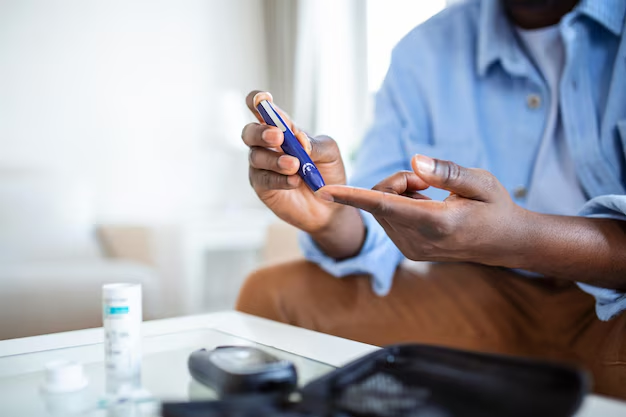Your Guide to Can You Get Hypoglycemia Without Diabetes
What You Get:
Free Guide
Free, helpful information about Diabetes FAQ and related Can You Get Hypoglycemia Without Diabetes topics.
Helpful Information
Get clear and easy-to-understand details about Can You Get Hypoglycemia Without Diabetes topics and resources.
Personalized Offers
Answer a few optional questions to receive offers or information related to Diabetes FAQ. The survey is optional and not required to access your free guide.
Can You Experience Low Blood Sugar without Having Diabetes?
When we think of low blood sugar, often associated with hypoglycemia, diabetes is the usual suspect. Yet, it might surprise many to learn that hypoglycemia can indeed occur in individuals without diabetes. Understanding the causes and knowing when to seek help can make a significant difference in managing this condition.
What Causes Hypoglycemia in Non-Diabetics?
Hypoglycemia occurs when there's an abnormal drop in blood glucose levels, typically below 70 mg/dL. For non-diabetics, several factors could be the culprits:
- Reactive Hypoglycemia: This type kicks in shortly after eating and is often due to the body producing too much insulin.
- Fasting Hypoglycemia: Low blood sugar without food intake for extended periods, often linked to certain medical conditions.
- Consumption of Alcohol: Drinking alcohol, especially on an empty stomach, can prompt hypoglycemia.
- Certain Medications: Some medicines, particularly those related to kidney or heart health, may inadvertently lower blood sugar levels.
- Hormonal Imbalances: Adrenal insufficiencies or pituitary issues can disturb glucose regulation.
The symptoms—ranging from shakiness, sweating, confusion, to even more severe reactions—mirror those found in diabetics, making it essential to be vigilant and proactive.
Seeking Medical and Lifestyle Interventions
Managing non-diabetic hypoglycemia often revolves around lifestyle modifications and addressing underlying health issues. Here's what can be done:
- Balanced Meals: Consuming complex carbohydrates with proteins and fats to stabilize blood sugar.
- Regular Eating Schedule: Avoiding long gaps between meals can prevent sharp drops in glucose levels.
- Limit Alcohol and Caffeine: Moderation is key, as both can have unpredictable effects on blood glucose.
- Consult Healthcare Professionals: If hypoglycemia persists, professional advice through a detailed medical evaluation is crucial.
While healthcare guidance is paramount for managing health conditions like hypoglycemia, financial resilience can also play a crucial role in maintaining overall well-being. Many people may not realize the multitude of financial and educational resources available for support.
Building Financial Resilience and Educational Opportunities
Navigating medical issues, whether mild or serious, can place unexpected strains on finances. Fortunately, numerous programs and solutions can aid individuals in maintaining their financial health while addressing medical needs:
- Government Aid Programs: These can include assistance with healthcare costs, medications, or low-income support for those facing medical expenses.
- Debt Relief Options: Specialized programs can help consolidate medical debt or provide low-interest options for those struggling with unexpected healthcare costs.
- Credit Counseling and Solutions: Working with certified counselors can help manage debt, including medical bills, and create sustainable financial plans.
- Educational Grants and Opportunities: Available for many seeking to enhance their skills, often with specific scholarships for those looking to enter health-related fields or areas of economic growth.
Addressing both health and financial well-being can provide a comprehensive approach to managing challenges like hypoglycemia and beyond.
Helpful Resources for Financial and Educational Support
- 🏥 Medicaid and CHIP: Programs for healthcare coverage for low-income individuals and families.
- 💳 Debt Consolidation Options: Reduce stress with simplified payment plans.
- 💡 Educational Scholarships: Financial aid is available for courses in health or growth industries.
- 🏦 Non-Profit Credit Counseling: Aid in managing personal finances and debt.
- 📚 Free Workshops and Training: Community resources for enhancing skills and knowledge.
Taking advantage of these resources can lead to a healthier, more financially secure life. Whether dealing with health conditions like hypoglycemia or seeking knowledge advancement, the right support can make all the difference.
What You Get:
Free Diabetes FAQ Guide
Free, helpful information about Can You Get Hypoglycemia Without Diabetes and related resources.

Helpful Information
Get clear, easy-to-understand details about Can You Get Hypoglycemia Without Diabetes topics.

Optional Personalized Offers
Answer a few optional questions to see offers or information related to Diabetes FAQ. Participation is not required to get your free guide.


